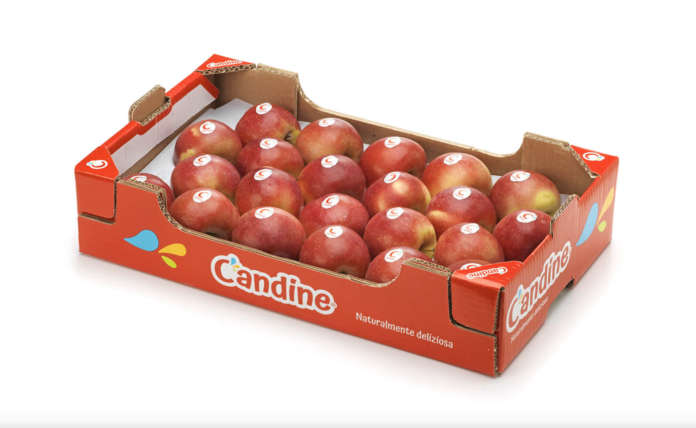Una mela succosa, croccante, con alto grado brix, più resistente ai patogeni. Gli investimenti in progetti di mele Club che rispondono ai trend globali sono in crescita. Uno di questi è Candine, sul mercato da un quinquennio, e vede protagonista Apofruit. Il brand della varietà Regal You, selezionata dal costitutore Agro Selection Fruits, punta a farsi largo tra le 86 mele Club commercializzate in Europa e più di 60 in Italia. La produzione per questa stagione è in crescita e si aggira sulle 2 mila tonnellate rispetto alle 1.400 della precedente. Sono circa 60 le aziende agricole socie di Apofruit che aderiscono al progetto. E circa 120 gli ettari coltivati con questa nuova varietà in tre territori, Piemonte, Trentino ed Emilia-Romagna. La caratteristica dolcezza la rende ideale per il mercato italiano e del Sud dell’Europa ma anche asiatico. “Puntiamo a 250 ettari nel 2026 che corrispondono a circa 10 mila tonnellate -sottolinea il direttore commerciale di Apofruit Mirco Zanelli-. Con l’aumento della produzione e la conoscenza della varietà su altri territori, stiamo sviluppando ulteriori mercati, Spagna e Germania per l’Europa e Sudest asiatico per il prodotto oltremare, in particolare Taiwan”.
Candine, una mela con vantaggi agronomici e commerciali
Candine è stata messa in prova, per testarla, in diverse aree produttive, Italia, Francia e Spagna. “Abbiamo deciso di portare avanti il progetto in esclusiva per l’Italia dando mandato a Ri.nova di partecipare a un bando di ricerca per la promozione, divulgazione e conservazione del prodotto” fa sapere Andrea Grassi, direttore innovazione e sviluppo di Apofruit. Candine ha aspetti importanti dal punto di vista agronomico e commerciale. “È una varietà che porta in sé i geni della Fuji. Ma sopperisce ad alcuni suoi problemi, come la difficoltà di colorazione del frutto. Risente meno dell’alternanza di produzione in cui si alternano anni di elevata carica produttiva (dunque meno sapidità del frutto, calibro piccolo, meno colorazione) con anni di scarico”. Dolce (grado brix intorno a 14), succosa e croccante, ha un’aromaticità persistente ed è bicolore. “Colora meglio, soprattutto in quota ma non solo. Ed è resistente alla ticchiolatura. È nata, infatti come approccio al bio, tanto che la nostra produzione è per il 30% in biologico”. Il progetto prevede anche lo studio dei risultati derivanti dall’utilizzo del Dss (decision support system) Bluleaf, una piattaforma tecnologica per l’agricoltura 4.0 che supporta le imprese nell’ottimizzazione degli apporti in termini di acqua e fertilizzanti.
‘Candine’ Club apple is growing and looks overseas
This project, carried out exclusively for Italy by Apofruit, also aims at exports: Spain, Germany, but also Taiwan
A juicy, crunchy apple, with high brix level, more resistant to pathogens. Investments in Club apple projects that respond to global trends are growing. One of the varieties is Candine, on the market for five years, and features Apofruit as the protagonist. The brand of Regal You variety, selected by the breeder ‘Agro Selection Fruits’, aims at making its way among the 86 Club apples marketed in Europe and more than 60 in Italy. Production for this season is growing and is around 2 thousand tonnes compared to 1400 in the previous one. There are approximately 60 Apofruit member farms that join this project. And around 120 hectares are cultivated with this new variety in three territories, Piedmont, Trentino and Emilia-Romagna. The characteristic sweetness of this variety makes it ideal for the Italian market and the Southern European one, but also for Asian markets. Mirco Zanelli, commercial director of Apofruit, underlined: ‘We are aiming for 250 hectares in 2026, which correspond to approximately 10 thousand tonnes. With the increase in production and knowledge of this variety in other territories, we are developing further markets, Spain and Germany for Europe and Southeast Asia for the overseas product, in particular Taiwan’.
Candine was put on trial, to test it in various production areas, Italy, France and Spain. Andrea Grassi, innovation and development director of Apofruit, explained: ‘We decided to carry out this project exclusively for Italy by mandating Ri.nova to participate in a research call for the promotion, dissemination, and conservation of the product’. Candine has important aspects from an agronomic and commercial point of view. ‘It is a variety that carries within itself the Fuji genes. But it compensates for some of its problems, such as the difficulty in colouring the fruit. It is less affected by the alternation of production in which years of high production load (therefore less flavour of the fruit, small calibre, less colouration) alternate with years of low production’. It is sweet (brix level around 14), juicy, and crunchy, has a persistent aroma, and is two-coloured. ‘It colours better, especially at altitude, but not only. And it is resistant to scab. In fact, it was born as an approach to organic production, so much so that our production is 30% organic’. The project also involves the study of the results deriving from the use of Bluleaf DSS (decision support system), a technological platform for agriculture 4.0 that supports companies in optimizing their inputs in terms of water and fertilizers.









